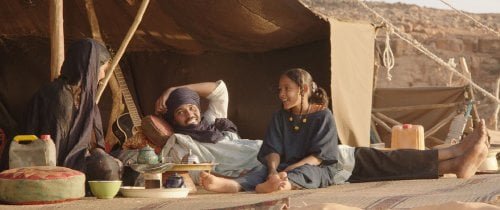Timbuktu

In the dunes of Mali, Kidane (Ibrahim Ahmed) lives peacefully and happily with his wife Satima (Toulou Kiki), daughter Toya (Layla Walet Mohamed) and an orphaned shepherd, but their world will be shattered by the Jihadists who have occupied nearby "Timbuktu."
Laura's Review: B+
When a couple with two children were stoned to death in a small town in Mali for the 'crime' of being unmarried and the media largely ignored the incident, cowriter (with Kessen Tall)/director Abderrahmane Sissako ("Bamako") decided to use art to get the world to listen. His stunningly beautiful, humanistic work has become Mauritania's first Oscar nominee for Foreign Language Film. The first image we see is of a young gazelle running, chased by a Jeep of Jihadists firing away. One of the men advises the others to stop shooting and just tire it out. Abdelkerim (Abel Jafri, "The Passion of the Christ") has his young driver/interpreter Omar (Cheik A.G. Emakni) stop for a little target shooting at some local cultural sculptures. These men are shattering a natural and beautiful peace. In the town, an armed man walks the streets barking out Sharia law - smoking is forbidden, as is music. A woman cleaning fish is chastised for not wearing gloves. But Sissako surprises us. While the local inhabitants are afraid, they also stand up for themselves. The Imam (Adel Mahmoud Cherif) calmly asks where the God they ostensibly honor is in all this - there is no answer. And the Jihadists are not mere villains. When Abdelkerim approaches Satima as she washes her hair and tells her her head must be covered, she tells him not to look at what he does not wish to see and he walks away. When Abu Jaafar (Damien Ndjie) demands that the source of music must be found, his conflicted soldiers report that they have found it but that the singing is praising Allah. The town's colorful and defiant Zabou (Kettly Noël) stops a Jihadist Jeep and is left to go her own way. As local boys 'play' soccer with an imaginary ball, Jihadist soldiers argue the merits of their favorite teams. But slowly, religious laws begin to be enforced, a woman (Fatoumata Diawara) given forty lashes for singing (and she sings while the punishment is meted out), a fourteen year-old girl forced into marrying a stranger against her mother's wishes. The central conflict occurs when Issan (Mehdi A.G. Mohamed), Kidane's shepherd, returns in tears, telling him that their favored cow, GPS, is dead. When Kidane goes to confront the local fisherman who killed it, a tragedy occurs and Kidane now must face the new law. If it seems perplexing that the incident is between two local men, Sissako's quiet design builds to a strong impact. That cow, with which Kidane makes his living, was encroaching in an area where another man makes his, just as the two men's habitat is being encroached upon by religious zealots. Rather than shock, Sissako envelops us in a heavy sadness as beauty and happiness is destroyed by the same species who had created it, a new generation left to suffer by the illogic of the one that preceded them. The magical production makes us feel the loss that much more deeply, the mesmerizing images of cinematographer Sofiane El Fani ("Blue Is the Warmest Color") complemented by Amin Bouhafa's orchestral score. "Timbuktu" lulls us with an ancient way of life, men playing primitive instruments with the glorious accompaniment of a female voice before the insanity of current intolerance breaks through their door. Grade:

